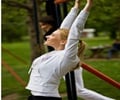Parents who know a child's preferences and participate in the activities can guide the kid assertively without reducing the child's enthusiasm for physical activity and exercise, reports a new study.

‘Children's enthusiasm for exercise was increased by a parental attitude that showed acceptance for the child's occasional lack of motivation.
’





Enthusiasm for physical activity and exercise was most often combined in children’s thoughts with parenting that promotes freedom of movement, takes into account interests, offers hobby opportunities, and participates in exercise with the child. Parental control, meaning varying degrees of coercion and disregarding the child’s role in exercise-related decision-making, was perceived as undesirable and reduced enthusiasm for exercise. Children aged 7 to 10 years were found to have a clear distinction between parenting that increases and reduces exercise motivation. "For example, strong, public and overt encouragement in tournaments and games was perceived in some cases as embarrassing and even shameful," explains postdoctoral researcher Arto Laukkanen. "In addition, underestimating and ignoring the temporary cessation of exercise motivation, for example, was perceived as controlling and reducing enthusiasm for exercise."
However, the interviews also highlighted experiences in which the parent’s strong guidance and instruction was perceived as acceptable and increasing exercise enthusiasm.
"The children pointed out situations where the parent’s actions had initially felt domineering and strict," Laukkanen says. "Common to experiencing such situations positively and strengthening exercise motivation was that the parent participated in the activities with the child. Secondly, these parents sensed the line between coercion and acceptable guidance in the child’s mind."
Limiting screen time under the guise of exercise eats up the enthusiasm for exercise
Advertisement
"This is very contradictory, as parents try to take care of the children’s screen time and adequate level of exercise, but at the same time, they may be contributing to alienation from exercise," Laukkanen says.
Advertisement
Some of the children’s experiences were the opposite. Some felt that they had infinitely flexible and loose boundaries for screen time.
"Limiting screen time independently can be challenging, especially for children," Laukkanen says. "In some cases, children also apply considerable effort and ingenuity to create more screen time for the day."
Combining screen time limitations and adequate physical activity seems like a complex challenge in families with children. Further research on this topic is urgently needed from the perspectives of both children and parents.
The study included 79 first-, second-, and third-grade students. Children’s perceptions of parenting that support exercise and physical activity motivation were examined through group interviews. The children participated in audio-recorded interviews lasting about half an hour in groups of an average of five pupils as part of a normal school day. Participation was voluntary.
Source-Eurekalert









